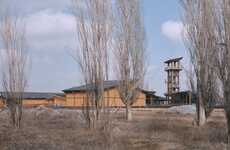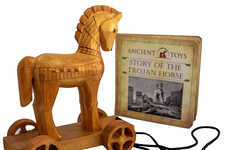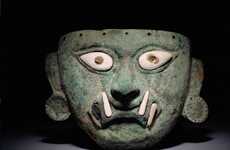
Once-Buried Ancient Urban Civilizations Worth a Visit
wang fangqing/ Frances Wang — April 15, 2009 — World
References: nationalgeographic
We’ve heard names of many ancient cities in mythology and folklore, but did these metropolises even exist for a second? National Geographic shows us that at least 12 of them were real, and were even fairly prosperous for a while according to the brilliant civilizations created thousands of years ago.
Troy, for instance, is one of them. The city, discovered by German archaeologist Heinrich Schliemann in 1871, was actually based in Hisarlik, Turkey.
And in Pakistan, the cities of Harappa and Mohenjo Daro would still belying underground if the Indus Valley civilization, which emerged 4,500 years ago, benefiting from the productive lands of the Indus River floodplain and trade with the civilizations of Mesopotamia, was not revealed in 1921.
Other 10 cities are dotted all over the world, including in England, Colorado, Iran and Iraq. Featured in the gallery are Petra, Machu Picchu, Troy, Indus Valley, Palmyra (Tadmor), Tanis, Nimrud, Persepolis, Stonehenge and Mesa Verde.
Troy, for instance, is one of them. The city, discovered by German archaeologist Heinrich Schliemann in 1871, was actually based in Hisarlik, Turkey.
And in Pakistan, the cities of Harappa and Mohenjo Daro would still belying underground if the Indus Valley civilization, which emerged 4,500 years ago, benefiting from the productive lands of the Indus River floodplain and trade with the civilizations of Mesopotamia, was not revealed in 1921.
Other 10 cities are dotted all over the world, including in England, Colorado, Iran and Iraq. Featured in the gallery are Petra, Machu Picchu, Troy, Indus Valley, Palmyra (Tadmor), Tanis, Nimrud, Persepolis, Stonehenge and Mesa Verde.
Trend Themes
1. Rediscovered Ancient Cities - Opportunity to explore and showcase ancient civilizations that were once lost to history.
2. Archaeological Tourism - Growing interest in visiting historical sites and ruins, driven by a desire for cultural exploration and education.
3. Untapped Historical Artifacts - Potential for discovering valuable artifacts and relics from ancient civilizations, creating new opportunities for collectors and museums.
Industry Implications
1. Travel and Tourism - Industry can capitalize on the increasing demand for travel experiences that involve historical and archaeological exploration.
2. Archaeology and Anthropology - Professionals in these industries can benefit from the interest in studying and preserving ancient civilizations and artifacts.
3. Museum and Heritage Sector - Opportunity to attract visitors and generate revenue by showcasing and interpreting the newly discovered ancient cities and artifacts.
0.8
Score
Popularity
Activity
Freshness























